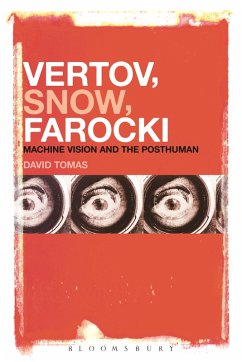Vertov, Snow, Farocki: Machine Vision and the Posthuman begins with a comprehensive and original anthropological analysis of Vertov's film The Man With a Movie Camera. Tomas then explores the film's various aspects and contributions to media history and practice through detailed discussions of selected case studies. The first concerns the way Snow's La Région Centrale and De La extend and/or develop important theoretical and technical aspects of Vertov's original film, in particular those aspects that have made the film so important in the history of cinema. The linkage between Vertov's film and the works discussed in the case studies also serve to illustrate the historical and theoretical significance of a comparative approach of this kind, and illustrate the pertinence of adopting a 'relational approach' to the history of media and its contemporary practice, an approach that is no longer focused exclusively on the technical question of the new in contemporary media practices but, in contrast, situates a work and measures its originality in historical, intermedia, and ultimately political terms.


